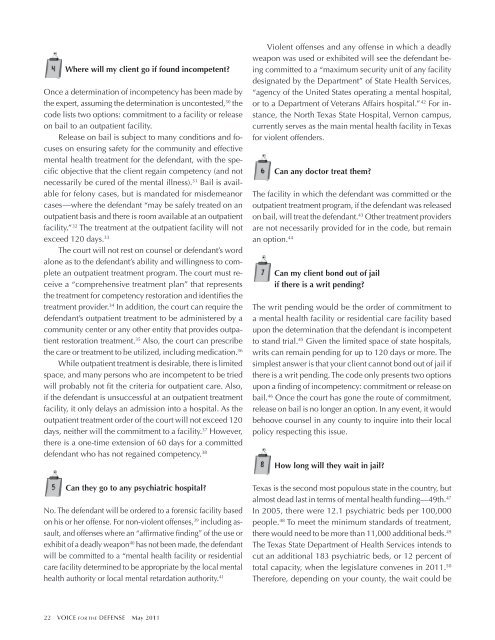for the defense for the defense - Voice For The Defense Online
for the defense for the defense - Voice For The Defense Online
for the defense for the defense - Voice For The Defense Online
You also want an ePaper? Increase the reach of your titles
YUMPU automatically turns print PDFs into web optimized ePapers that Google loves.
Where will my client go if found incompetent<br />
Once a determination of incompetency has been made by<br />
<strong>the</strong> expert, assuming <strong>the</strong> determination is uncontested, 30 <strong>the</strong><br />
code lists two options: commitment to a facility or release<br />
on bail to an outpatient facility.<br />
Release on bail is subject to many conditions and focuses<br />
on ensuring safety <strong>for</strong> <strong>the</strong> community and effective<br />
mental health treatment <strong>for</strong> <strong>the</strong> defendant, with <strong>the</strong> specific<br />
objective that <strong>the</strong> client regain competency (and not<br />
necessarily be cured of <strong>the</strong> mental illness). 31 Bail is available<br />
<strong>for</strong> felony cases, but is mandated <strong>for</strong> misdemeanor<br />
cases—where <strong>the</strong> defendant “may be safely treated on an<br />
outpatient basis and <strong>the</strong>re is room available at an outpatient<br />
facility.” 32 <strong>The</strong> treatment at <strong>the</strong> outpatient facility will not<br />
exceed 120 days. 33<br />
<strong>The</strong> court will not rest on counsel or defendant’s word<br />
alone as to <strong>the</strong> defendant’s ability and willingness to complete<br />
an outpatient treatment program. <strong>The</strong> court must receive<br />
a “comprehensive treatment plan” that represents<br />
<strong>the</strong> treatment <strong>for</strong> competency restoration and identifies <strong>the</strong><br />
treatment provider. 34 In addition, <strong>the</strong> court can require <strong>the</strong><br />
defendant’s outpatient treatment to be administered by a<br />
community center or any o<strong>the</strong>r entity that provides outpatient<br />
restoration treatment. 35 Also, <strong>the</strong> court can prescribe<br />
<strong>the</strong> care or treatment to be utilized, including medication. 36<br />
While outpatient treatment is desirable, <strong>the</strong>re is limited<br />
space, and many persons who are incompetent to be tried<br />
will probably not fit <strong>the</strong> criteria <strong>for</strong> outpatient care. Also,<br />
if <strong>the</strong> defendant is unsuccessful at an outpatient treatment<br />
fa cility, it only delays an admission into a hospital. As <strong>the</strong><br />
outpatient treatment order of <strong>the</strong> court will not exceed 120<br />
days, nei<strong>the</strong>r will <strong>the</strong> commitment to a facility. 37 However,<br />
<strong>the</strong>re is a one-time extension of 60 days <strong>for</strong> a committed<br />
defendant who has not regained competency. 38<br />
Can <strong>the</strong>y go to any psychiatric hospital<br />
No. <strong>The</strong> defendant will be ordered to a <strong>for</strong>ensic facility based<br />
on his or her offense. <strong>For</strong> non-violent offenses, 39 including assault,<br />
and offenses where an “affirmative finding” of <strong>the</strong> use or<br />
exhibit of a deadly weapon 40 has not been made, <strong>the</strong> defendant<br />
will be committed to a “mental health facility or residential<br />
care facility determined to be appropriate by <strong>the</strong> local mental<br />
health authority or local mental retardation authority. 41<br />
Violent offenses and any offense in which a deadly<br />
weapon was used or exhibited will see <strong>the</strong> defendant being<br />
committed to a “maximum security unit of any facility<br />
designated by <strong>the</strong> Department” of State Health Services,<br />
“agency of <strong>the</strong> United States operating a mental hospital,<br />
or to a Department of Veterans Affairs hospital.” 42 <strong>For</strong> instance,<br />
<strong>the</strong> North Texas State Hospital, Vernon campus,<br />
currently serves as <strong>the</strong> main mental health facility in Texas<br />
<strong>for</strong> violent offenders.<br />
Can any doctor treat <strong>the</strong>m<br />
<strong>The</strong> facility in which <strong>the</strong> defendant was committed or <strong>the</strong><br />
outpatient treatment program, if <strong>the</strong> defendant was released<br />
on bail, will treat <strong>the</strong> defendant. 43 O<strong>the</strong>r treatment providers<br />
are not necessarily provided <strong>for</strong> in <strong>the</strong> code, but remain<br />
an option. 44<br />
Can my client bond out of jail<br />
if <strong>the</strong>re is a writ pending<br />
<strong>The</strong> writ pending would be <strong>the</strong> order of commitment to<br />
a mental health facility or residential care facility based<br />
upon <strong>the</strong> determination that <strong>the</strong> defendant is incompetent<br />
to stand trial. 45 Given <strong>the</strong> limited space of state hospitals,<br />
writs can remain pending <strong>for</strong> up to 120 days or more. <strong>The</strong><br />
simplest answer is that your client cannot bond out of jail if<br />
<strong>the</strong>re is a writ pending. <strong>The</strong> code only presents two options<br />
upon a finding of incompetency: commitment or release on<br />
bail. 46 Once <strong>the</strong> court has gone <strong>the</strong> route of commitment,<br />
release on bail is no longer an option. In any event, it would<br />
behoove counsel in any county to inquire into <strong>the</strong>ir local<br />
policy respecting this issue.<br />
How long will <strong>the</strong>y wait in jail<br />
Texas is <strong>the</strong> second most populous state in <strong>the</strong> country, but<br />
almost dead last in terms of mental health funding—49th. 47<br />
In 2005, <strong>the</strong>re were 12.1 psychiatric beds per 100,000<br />
people. 48 To meet <strong>the</strong> minimum standards of treatment,<br />
<strong>the</strong>re would need to be more than 11,000 additional beds. 49<br />
<strong>The</strong> Texas State Department of Health Services intends to<br />
cut an additional 183 psychiatric beds, or 12 percent of<br />
total capacity, when <strong>the</strong> legislature convenes in 2011. 50<br />
<strong>The</strong>re<strong>for</strong>e, depending on your county, <strong>the</strong> wait could be

















